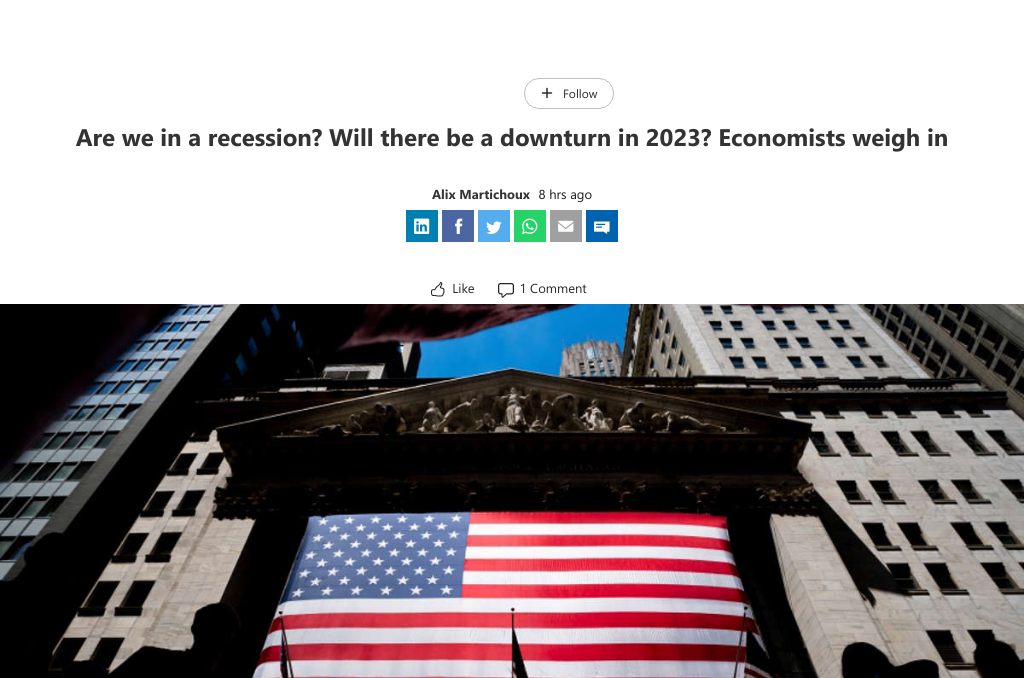As economists grapple with the question of when and if a recession will hit, many Americans are convinced that a slump is inevitable. According to a Real Estate Witch poll, three-quarters (75%) of Americans believe a recession will strike in 2023, while 69% say one is already here. To make matters worse, a survey of 48 forecasters issued by the National Association for Business Economics found that 60% of respondents believe there is a higher likelihood of a recession in the next 12 months than there is of avoiding an economic downturn.[0]
The National Bureau of Economic Research (NBER) defines a recession as “a significant decline in economic activity that is spread across the economy and that lasts more than a few months.”[1] To declare and officially recognize a recession, three criteria must be met to some degree – depth, diffusion, and duration. If one criterion presents extreme conditions, it may partially negate weaker indications from a different criterion.[2]
A survey of economists conducted by the National Retail Federation found that 28% expect a recession to begin this quarter, compared to the 52% who held that view in December. Approximately one-third of people predict that a recession will begin in the second quarter, with an additional 21% predicting it will start in the third quarter.
The U.S. Federal Reserve is currently trying to balance the need to control inflation with maintaining economic growth.[3] In order to battle inflation, authorities have typically applied monetary policy instruments, for instance increasing interest rates, to decelerate economic growth and reduce demand for goods and services.[4] An increase in interest rates can be detrimental if too drastic, as businesses and individuals will become less keen to invest or spend money.[4] This has led to many inquiries regarding recessions in general and how they are forecasted.
The Fed has raised interest rates 4.5 percentage points so far since March 2022, and in February lifted interest rates by a quarter of a point, the smallest amount in 10 months.[5] However, recent data suggests that inflation is still not under control, leading many to believe that the Fed will have to keep hiking interest rates.[6]
Consumer spending is greatly impacted by inflation.[4] With prices increasing, individuals are required to devote more of their funds to basic needs, leaving less to be spent on extras.[4] According to a survey by the National Retail Federation, 55% of US consumers are cutting back on spending due to higher prices, and 64% are changing the way they shop.[4] This development can cause a decrease in customer trust and a decrease in economic activity.[4]
0. “Are we in a recession? Will there be a downturn in 2023? Economists weigh in” msnNOW, 12 Mar. 2023, https://www.msn.com/en-us/money/markets/are-we-in-a-recession-will-there-be-a-downturn-in-2023-economists-weigh-in/ar-AA18wQgG
1. “Are We in a Recession? 43% of Americans Think So” Money Talks News, 11 Mar. 2023, https://www.moneytalksnews.com/are-we-in-a-recession-43-of-americans-think-so/
2. “Part of a Cycle: A Recession Primer” TD Economics, 9 Mar. 2023, https://economics.td.com/ca-recession-primer
3. “The Tricky Dynamic Between Stemming Inflation and a Mitigating a Recession” njbmagazine.com, 10 Mar. 2023, https://njbmagazine.com/njb-news-now/the-tricky-dynamic-between-stemming-inflation-and-a-mitigating-a-recession
4. “The Economy’s Inflationary Woes: A Recession Looms Ahead” Industry Leaders Magazine, 12 Mar. 2023, https://www.industryleadersmagazine.com/the-economys-inflationary-woes-a-recession-looms-ahead/
5. “The economy has avoided a recession so far — and it could be a nightmare for the Fed” Yahoo Life, 7 Mar. 2023, https://www.yahoo.com/lifestyle/economy-avoided-recession-far-could-175254818.html
6. “Why the recession is always six months away” USA TODAY, 9 Mar. 2023, https://www.usatoday.com/story/money/economy/2023/03/09/recession-six-months-away/11434858002
